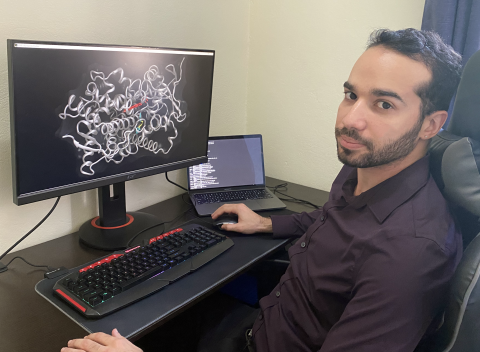


Research Fellow
Background
Born in Jamaica, I attended Ardenne High School before migrating to the UK after my CXCs in 2006, where I completed a BSc in Medical Biochemistry (2012) at Leeds University. This was a lab-focused degree built on a biochemistry foundation, with elements of molecular biology, microbiology, immunology, virology, toxicology, and pharmacology. Upon completion, I migrated to New Zealand, where I completed an MSc (2014) and a PhD (2018) in Computational Biochemistry under the supervision of Associate Professors Jane Allison and Jack Flanagan. Drawing heavily on my undergraduate background in medical biochemistry, both degrees involved the use of molecular modelling to characterise protein–membrane interactions, yielding mechanistic insight into oncogenic cellular signalling systems and how their malfunctions lead to disease, particularly cancer, with the ultimate goal of structure-guided drug design.
Not long into the pandemic, I returned to Jamaica in 2020 to take up the position of research fellow at NPI. Here, I have applied my advanced knowledge of structural bioinformatics to further the understanding of natural products, their constituents, and how they are metabolized to produce a range of properties that can be exploited to generate unique pharmacological compounds to target disease. Furthermore, I have added to my range of computational techniques to introduce an in silico aspect to the in vitro and in vivo studies under various projects at the institute.
Select Journal Publications
Irvine, W. A., Flanagan, J. U., & Allison, J. R. (2019). Computational prediction of amino acids governing protein-membrane interaction for the PIP3 cell signaling system. Structure, 27(2).
Huber, R. G., Carpenter, T. S., Dube, N., Holdbrook, D. A., Ingólfsson, H. I., Irvine, W. A., Marzinek, J. K., Samsudin, F., Allison, J. R., Khalid, S., & Bond, P. J. (2019). Multiscale modeling and simulation approaches to lipid–protein interactions. Methods in Molecular Biology, 1–30.
Wauchope, S., Roy, M. A., Irvine, W., Morrison, I., Brantley, E., Gossell-Williams, M., Timme-Laragy, A. R., & Delgoda, R. (2021). Dibenzyl trisulfide binds to and competitively inhibits the cytochrome P450 1A1 active site without impacting the expression of the aryl hydrocarbon receptor. Toxicology and Applied Pharmacology, 419, 115502.
Clarke, N., & Irvine, W. (2022). In silico design and SAR study of dibenzyl trisulfide analogues for improved CYP1A1 inhibition. ChemistryOpen, 11(5).
There is currently no content classified with this term.